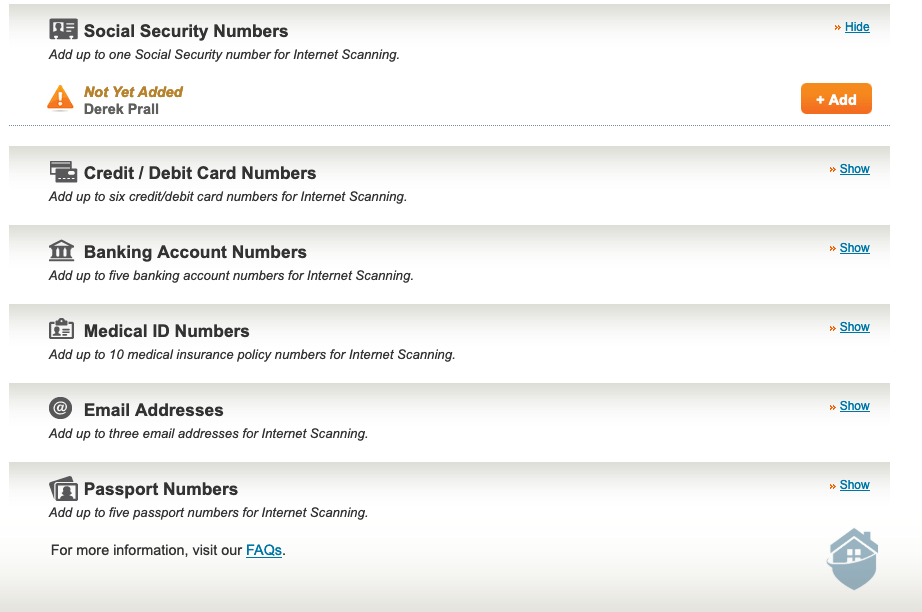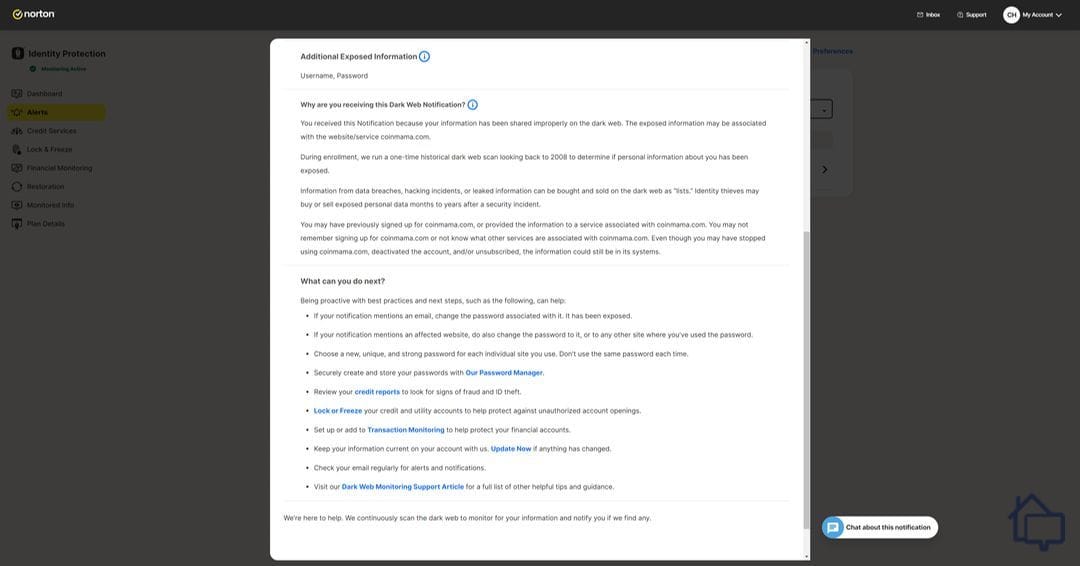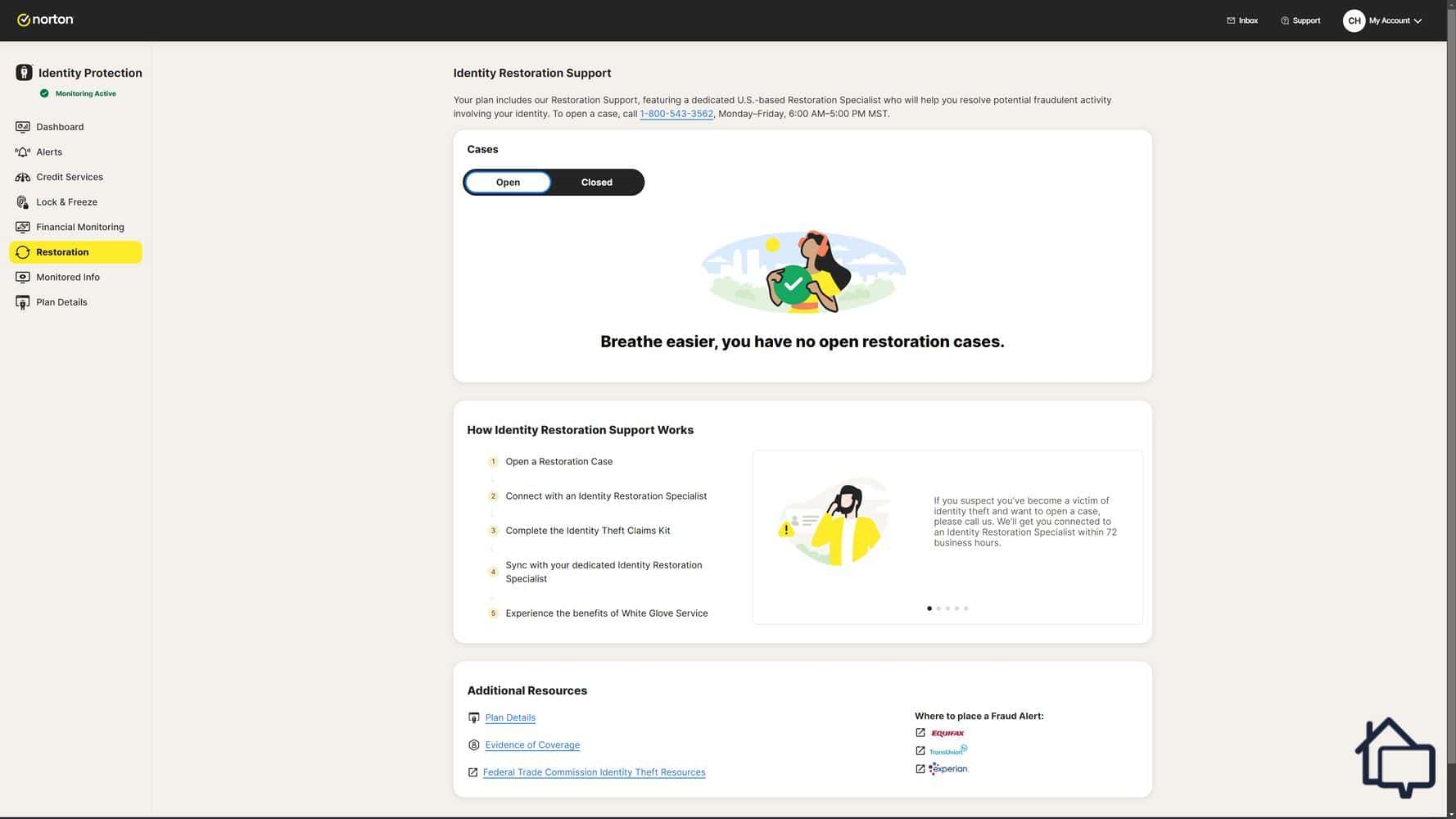You might think Equifax would provide great identity theft protection since they’re one of the three major credit bureaus. But, after comparing them to LifeLock, we found their service lacking in several key categories.
With over 20 million people in the U.S. falling victim to identity theft in one year, you’re smart to look for an identity theft protection service.1 During your search, you’re bound to come across LifeLock and Equifax. They’re two household names — with LifeLock being known for their identity theft protection service, while Equifax is known for being one of the three major credit bureaus. But, do either of them offer good protection? And, which one’s better?
We tried each service for one month to see how they protect identities on a day-to-day basis and figure out which one’s better. After the test, we decided we like LifeLock better, as they offer more comprehensive protections and safety nets in the form of insurance. We know that won’t convince you, though, so we’re going to dig into all the details of each service to help you decide which one’s right for you.
>> Read About: Best Identity Theft Protection Services in 2025
Did You Know? Equifax compiles information on over 800 million individual consumers and more than 88 million businesses worldwide.

Along with our LifeLock subscription, we also got access to Norton360 to protect us from digital threats.
Overview: LifeLock vs. Equifax
Both LifeLock and Equifax offer similar core features like Social Security number monitoring and fraud alerts, but when it comes to execution, these companies are on opposite ends of the spectrum. When we reviewed Equifax, we found it to be a much more utilitarian service, foregoing the frills and perks we saw when we looked at LifeLock. Both services are complete and their coverage is — in our opinion — more than adequate, but you get a lot more features when you choose LifeLock.
Before we dive into the details, we want to highlight the key similarities and differences between these two identity theft protection services.
>> Learn More: A 2025 Comparison of Identity Theft Protection Services
Similarities Between Equifax and LifeLock

As big travelers, we appreciate that Equifax scanned our passport numbers as part of their Web Protect feature.
While we much prefer LifeLock over Equifax, they do have a lot in common. Here are the key similarities between Equifax and LifeLock’s identity theft protection services:
- SSN Monitoring: We expect SSN monitoring from every identity theft protection service we test. It’s the core feature of identity theft protection, so we’re glad to see that LifeLock and Equifax offer it.
- Dark Web Monitoring: Taking things a bit further, both LifeLock and Equifax scour the dark web for your information and alert you if they find any data leaks related to your identity.
- Identity Restoration Services: If you do fall victim to identity theft while subscribed to either LifeLock or Equifax, their experts will help you recover your identity.
- Three-Bureau Credit Monitoring: While it’s not included in every plan for either provider, Equifax and LifeLock both make three-bureau credit monitoring available in their more premium subscriptions.
- Stolen Funds Reimbursement: LifeLock and Equifax will reimburse you if any of your money gets stolen as a result of an identity theft incident.
- Family Plans With Child Identity Monitoring: Your kids are vulnerable to identity theft, too. That’s why LifeLock and Equifax offer child identity monitoring and insurance, which is surprisingly uncommon in the industry. Although, only LifeLock made our list of the best family identity theft protection services.
Differences Between Equifax and LifeLock
There’s a lot in common between Equifax and LifeLock, but, after we put each service to the test, we noticed a few key differences, including:
- A Free Plan: One thing that’s nice about Equifax is that they offer a free plan. It only includes credit monitoring for their own credit bureau, though. LifeLock charges for any amount of protection.
- Crime Alerts: Criminal identity theft occurs when someone uses your identity when committing a crime. LifeLock monitors for criminal activity associated with your name, so you can clear your name before further action is taken by the authorities. Equifax does not offer this form of monitoring.
- Cybersecurity: Since LifeLock was bought by Norton, they started offering comprehensive cybersecurity bundles with some of their identity theft protection subscriptions. Even Equifax’s premium subscriptions do not include any cybersecurity tools.
- Home Title Monitoring: Identity thieves can fraudulently use your home title to take out loans in your name leveraged against your house. LifeLock monitors for this type of fraud, unlike Equifax.
- Social Media Monitoring: Someone who hacks into your social media accounts can use them to scam your close friends and family. To prevent this, LifeLock includes social media monitoring in their premium plans, something Equifax did not offer us.
- 24/7 Customer Support: To get in contact with Equifax, you need to call them during their business hours. LifeLock offers 24/7 phone support and a live chat.
LifeLock vs. Equifax: A Detailed Breakdown
Now that we’ve covered a high-level overview of LifeLock and Equifax’s similarities and differences, let’s dig into the details with a point-by-point comparison.
Pricing

After buying our Equifax subscription, we had to “purchase” WebDetect to activate their internet monitoring feature.
Surprisingly, LifeLock and Equifax charge similar rates. That surprises us because of how many more features LifeLock offers than Equifax. Both also offer a discount for paying for a full year upfront, which we recommend since they both give prorated refunds — meaning, they’ll refund you for any unused months in your annual subscription. LifeLock also offers a 60-day full money-back guarantee on their annual subscriptions.
LifeLock’s Pricing
We won’t sugarcoat it: LifeLock’s pricing can get confusing. They offer four tiers of service, although two of the tiers are almost identical with the only difference being that one gives you the option of adding Norton 360. Here’s an overview of LifeLock’s pricing:
| LifeLock Services | Standard | Select | Advantage | Ultimate Plus |
|---|---|---|---|---|
| Credit Monitoring | Single Bureau | Single Bureau | Single Bureau | Triple Bureau |
| Annual Credit Report and Scores | Not Provided | Not Provided | Single Bureau | Triple Bureau |
| TransUnion Credit Lock | Not Provided | Not Provided | Provided | Provided |
| Fictitious Identity Monitoring | Not Provided | Not Provided | Provided | Provided |
| Home Title Monitoring | Not Provided | Not Provided | Not Provided | Not Provided |
| Identity Restoration | Up to $1 Million | Up to $1 Million | Up to $1 Milllion | Up to $1 Million |
| Stolen Funds Reimbursement | Up to $25,000 | Up to $25,000 | Up to $25,000 | Up to $25,000 |
| Personal Expense Compensation | Up to $25,000 | Up to $25,000 | Up to $100,000 | Up to $1 Million |
| Norton 360 | Unavailable | +$0.83 Per Month | +$2 Per Month | +$5 Per Month |
| Price | Starts at $7.50 Per Month | Starts at $7.50 Per Month | Starts at $14.99 Per Month | Starts at $19.99 Per Month |
One thing to note about LifeLock’s pricing is that they charge more when you renew your plan. The prices we listed above are for your first year. Expect their prices to increase by about 30 percent upon renewal.
>> Check Out: Best Identity Theft Protection Services for Couples
Pro Tip: LifeLock lets you turn any of their plans into a family plan as well. We recommend selecting an actual family plan before checkout, though, as they charge more if you add an adult or children at checkout instead of selecting a family plan. For instance, buying an annual Advantage plan for two adults costs $23.99 per month, whereas adding another adult at checkout would bring that price up to $30.19 per month.
Equifax Pricing
Equifax makes their pricing simpler than LifeLock, although we didn’t think we got as much value from their plans. Here’s an overview of Equifax’s plans and pricing:
| Equifax Service | ID Patrol | Complete Premier | Complete Family Plan |
|---|---|---|---|
| Covered Adults | One | One | Two and Four Children |
| Triple-Bureau Credit Monitoring | Yes | Yes | Yes |
| Triple-Bureau Credit Scores and Report | Yes | Yes | Yes |
| Internet Monitoring | Yes | Yes | Yes |
| Fraud Alerts | Yes | Yes | Yes |
| Equifax Credit Lock | Yes | Yes | Yes |
| 24/7 Access to Equifax Credit Score and Report | No | Yes | Yes |
| Equifax Credit Score Monitoring | No | Yes | Yes |
| Identity Restoration Services | No | Yes | Yes |
| Stolen Funds Replacement | Up to $1 Million | Up to $1 Million | Up to $1 Million |
| ID Theft Insurance | Up to $1 Million | Up to $1 Million | Up to $1 Million |
| Price | $16.95 Per Month | $19.95 Per Month | $29.95 Per Month |
You can get two free months for any Equifax plan by paying for one year upfront. They also offer a completely free plan, but that only includes a monthly report of your credit from Equifax.
Winner: LifeLock
Features

LifeLock’s modern design made it easy for us to access and use all of their features.
We’ve been saying it all along, but LifeLock really does offer a ton more features than Equifax. Here’s a side-by-side comparison between the features that LifeLock and Equifax offer:
| Feature | LifeLock | Equifax |
|---|---|---|
| SSN Monitoring | Yes | Yes |
| Three-Bureau Credit Monitoring | Yes | Yes |
| Lost Wallet Assistance | Yes | Yes |
| Buy Now Pay Later Alerts | Yes | No |
| Fictitious Identity Monitoring | Yes | No |
| Phone Takeover Monitoring | Yes | No |
| Bank Account Application Alerts | Yes | No |
| Investment Account Alerts | Yes | No |
| Home Title Monitoring | Yes | No |
That’s not even all of the features that LifeLock offers, and we didn’t include any features offered by their Norton 360 bundles. We only highlighted the main features offered by LifeLock above, but it still shows how much more monitoring they offer than Equifax. More monitoring means they can catch more forms of identity theft before it cascades out of control.
Winner: LifeLock
>> Read More: Recovering Lost or Stolen Items
FYI: While both LifeLock and Equifax offer three-bureau credit monitoring, only LifeLock made our list of the best credit monitoring services. That’s because they include other monitoring to protect your credit score, like bank account application alerts and investment account alerts.
User Experience

Our experience using Equifax suffered due to their outdated interface.
For identity theft protection services to work, you need to go through an onboarding process. That involves inputting all of the information you want the service to monitor. If they don’t know your SSN, they can’t monitor it — and that goes for all of your information. This process can easily take several hours with a poorly designed user experience, and it can get frustrating, too. Trust us, we know.
We went through the entire onboarding process for both services, and, while neither was the worst we’ve had to deal with, we much preferred LifeLock. It has a more modern user interface, which makes the program easier to navigate. We also liked the layout and tooltips they provided along the way. Since they offer so much more in terms of monitoring, though, they needed more of our information than Equifax for us to use all of their features. That made the onboarding process a bit longer, but it was less frustrating, too.
Winner: LifeLock
Customer Support

We could easily chat with LifeLock’s customer support about our notifications for further assistance.
When we assess customer support services, we always look at availability and the quality of support. On both accounts, we liked LifeLock better. Their phone support is available 24/7, and they offer a live chat. Equifax limits their phone support from 9 a.m. to 9 p.m. Monday through Friday and 9 a.m. to 6 p.m. Saturday and Sunday. Those are EST times. They also do not have a live chat at all.
As for the quality of support, LifeLock’s agents gave us faster responses and were regularly able to resolve our support requests on our first contact. We will say, we’d recommend their phone line for any complicated support requests. The live chat seems to consist more of sales agents than technical support. With Equifax, they usually needed to direct us to a higher tier of support to resolve our issue, which meant we had to wait on hold most of the time we needed help.
Winner: LifeLock
Did You Know? 24/7 support is extremely important for identity theft protection services. When you notice suspicious activity, you need to take action immediately to minimize any potential impact. With 24/7 support, you can always get the help you need as soon as you notice something wrong.
Insurance and Restoration

LifeLock made it easy for us to submit a claim for their identity theft insurance right on their dashboard.
It’s hard to beat LifeLock’s up to $3 million insurance, which is why it’s our favorite identity theft restoration service. That $3 million is spread across three different categories, and it’s only available with LifeLock’s premium plan. So, you get $1 million to cover identity recovery expenses, $1 million in stolen funds reimbursement, and $1 million in personal expense reimbursement. The stolen funds reimbursement and personal expense reimbursement go down with each tier below the premium plan, but, even at the lowest of $25,000 for each, they still beat Equifax’s flat $1 million insurance.
While we prefer LifeLock’s insurance, we like how Equifax allows their $1 million insurance to be used for either recovery expense or stolen funds reimbursement. That means if you have $500,000 of expenses from identity theft and the thief stole $500,000 from you, Equifax would cover it all. With LifeLock’s mid-tier plan, however, you’d get all the expenses reimbursed but only $100,000 of your stolen funds reimbursed.
As for restoration services, we were not able to test the restoration efforts of either company ourselves since our identity wasn’t stolen while we were subscribed to either service. But, each company provides you with an ID theft restoration expert to guide you through the entire restoration process. You can expect them to tell you exactly who you need to call to get your identity back as well as pre-fill any forms. So, all you need to do is sign forms and attend any necessary in-person meetings.
Winner: LifeLock
>> Learn More: Best Alternatives to LifeLock Identity Theft Protection in 2025
LifeLock vs. Equifax — Getting Down to Brass Tacks
Unless you’re looking for a free plan, we recommend LifeLock, hands down. For similar prices, LifeLock offers more monitoring to protect your identity and more insurance if it gets stolen. The only thing to watch out for is their price increases on renewal, which can easily catch customers off guard.
It’s not even that Equifax’s service is necessarily bad, either. We’d put it in line with the average identity theft protection service, if not a little better. LifeLock’s protection is just some of the best we’ve used, and that’s hard to compete with — even for Equifax, one of the three major credit bureaus.
FAQs About Both Services
- Does Equifax or LifeLock monitor all three credit bureaus?
Yes, the premium plans of both Equifax and LifeLock provide monitoring for your Equifax, Experian, and TransUnion credit file, while also providing access to complete scores from all three bureaus.
- Who offers more insurance, Equifax or LifeLock?
LifeLock offers more insurance at every tier compared to any Equifax tier. You’ll get at least $1,050,000 insurance from LifeLock, whereas Equifax’s insurance caps out at $1,000,000.
- Do Equifax and LifeLock both have mobile apps?
While both providers offer an app, LifeLock’s is a comprehensive app for all of their features, whereas Equifax’s app only focuses on their credit monitoring features.
- Do LifeLock or Equifax allow me to lock my credit report?
Yes, both services allow you to lock a credit report. Equifax locks their own, and LifeLock will lock your TransUnion report.
- Does Equifax or LifeLock offer more comprehensive monitoring?
Hands down, LifeLock offers more comprehensive monitoring. Equifax only offers basic monitoring even in their premium tier, while LifeLock keeps their monitoring service up-to-date to protect you against modern threats like fictitious identity theft, where someone uses a portion of your identity to create a fake identity.










